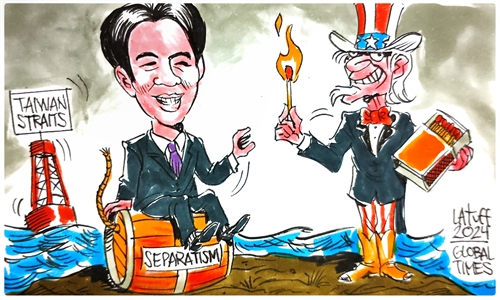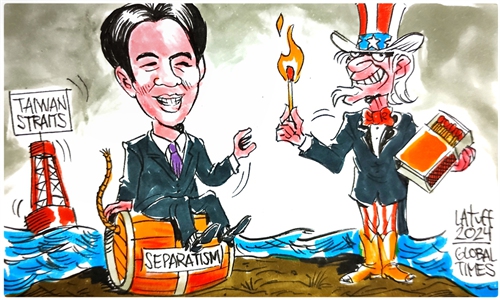
Lai Ching-te Photo: VCG
On May 20, Lai Ching-te assumed the role of Taiwan region's new leader and delivered his inaugural speech. Lai shamelessly stated in his speech that "the Republic of China Taiwan is a sovereign, independent nation" and "the Republic of China and the People's Republic of China are not subordinate to each other," spewing various "Taiwan independence" fallacies and hostile provocations against the Chinese mainland, once again exposing his stubborn nature as "a worker for Taiwan independence." This speech can be described as a blatant "Taiwan independence manifesto" and "a declaration of harm to Taiwan." It is extremely dangerous, and the Taiwan compatriots should be particularly vigilant and united in opposition.
We noticed that in this speech, the term "democracy" was mentioned 31 times, and "peace" 21 times, which precisely exposes the anxiety of the Democratic Progressive Party (DPP) authorities - they are well aware that what they are doing now is pushing Taiwan into a dangerous pit of war and danger, hence desperately using "democracy" as a fig leaf and talisman to cover themselves. It is clear to all discerning eyes that the so-called "democracy" is nothing but inferior makeup smeared on the face of "Taiwan independence," unable to conceal its true face of "seeking independence by relying on foreign support and by force."
In the positioning of cross-Straits relations, Lai boldly defines the two sides of the Straits as "two countries," listing "Taiwan," "Republic of China Taiwan," and "Republic of China" as so-called "national names," further advancing on the "one China, one Taiwan" path of "Taiwan independence." This blatant "two states" theory cannot change the fact that Taiwan is only a part of China, nor can it stop the historical trend of reunification of the motherland. Its only effect is to exacerbate the tension in the Taiwan Straits and make Taiwan society pay a high price for the reckless gamble of "Taiwan independence."
While treating compatriots from the mainland as "foreigners," Lai in his speech regards Western anti-China forces as "family members," throughout the speech filled with servility and begging for mercy from Western anti-China forces, which is very shameful. In order to gain the support of Western anti-China forces, he claims that "the world greeting a new Taiwan," Taiwan is "an important link in the global chain of democracies," " Taiwan is strategically positioned in the first island chain," and so on. These remarks of selling out Taiwan treat the hard-earned social achievements and wealth accumulated by the Taiwan residents for decades as offerings to anti-China forces in the West, reducing Taiwan to a pawn of the US and giving it the appearance of "unworthy descendants."
Even more dangerous is the subtle manifestation of the arrogant ambition of "seeking independence by force" in his speech. On the one hand, Lai echoes the fallacies of certain Western countries, smearing the mainland as a "threat"; on the other hand, he attempts to indoctrinate the residents in Taiwan into cannon fodder for "Taiwan independence," openly advocating for raising the citizens' "defense awareness," fully exposing the sinister intention of sacrificing innocent people on the island for the selfish desire of "Taiwan independence."
In the past, members of the DPP had a bad habit: Whenever they found themselves in a political dead end, such as being caught in corruption scandals or having their sex scandals exposed, they would play the "Taiwan independence card" to stay afloat. Unexpectedly, Lai, who has just taken office, is resorting to the "Taiwan independence card" right from the start of his tenure. However, the mainstream public opinion on the island is to pursue peace instead of war, development instead of decline, communication instead of separation, and cooperation instead of confrontation. This is not only the common voice of the 23 million people in Taiwan, but also the strong resonance of over 1.4 billion Chinese people.
The motherland must be unified, and it will inevitably be unified. Regardless of changes in the situation on the island or who holds power, it cannot change the fact that both sides of the Straits belong to one China, nor can it change the fundamental pattern and direction of cross-Straits relations, or block the historical trend of the eventual reunification of the motherland.
"Lai-style Taiwan independence" will only exacerbate the confrontation and instability across the Straits, inevitably leading to self-overestimation and self-destruction.


